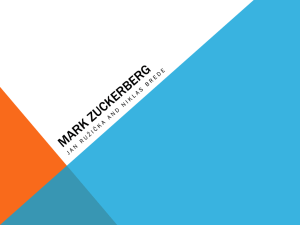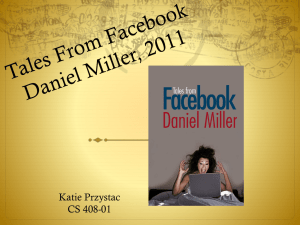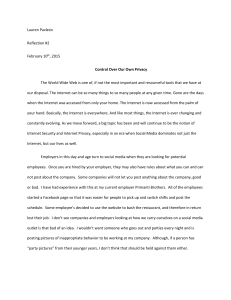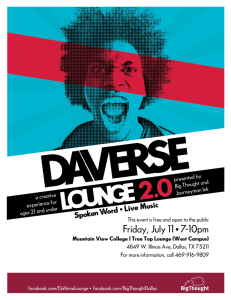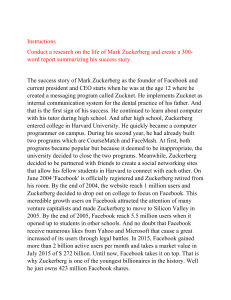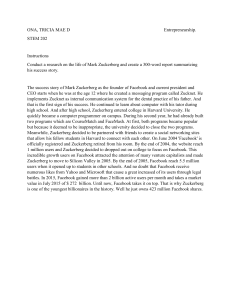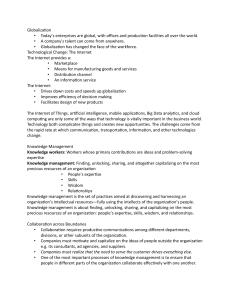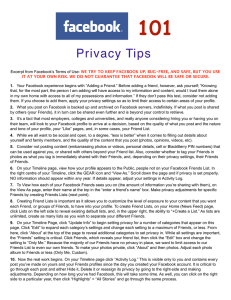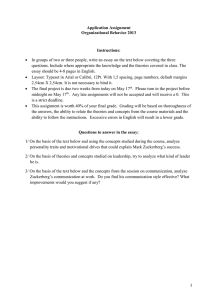This is reflection #2 - Web Hosting (community.wvu.edu)
advertisement
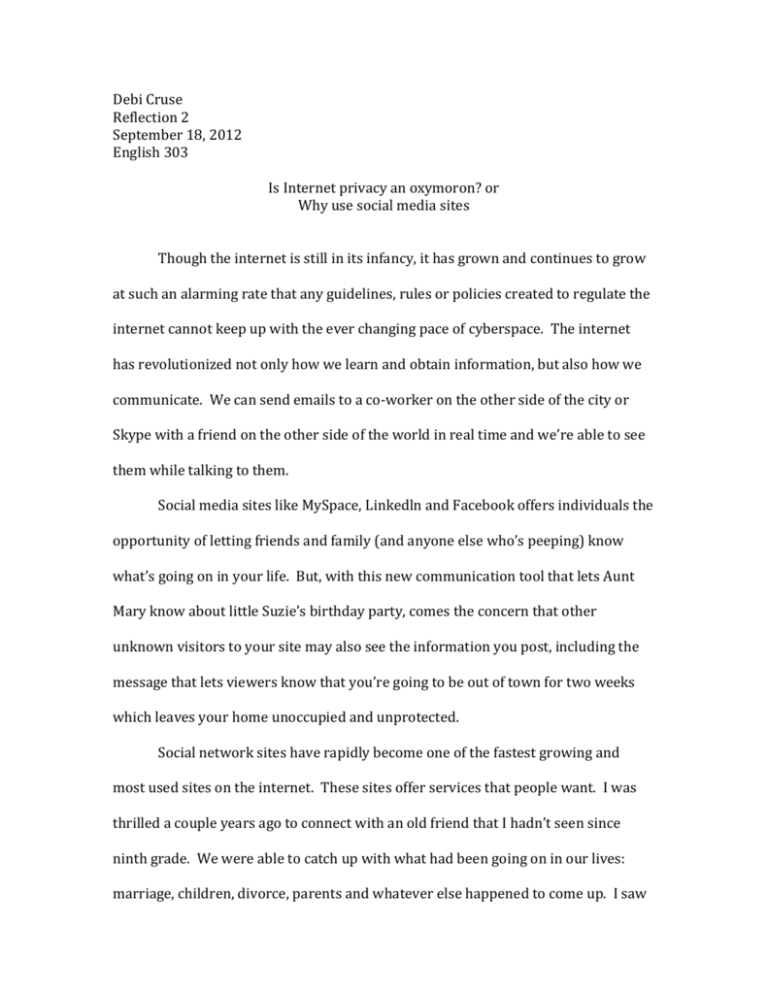
Debi Cruse Reflection 2 September 18, 2012 English 303 Is Internet privacy an oxymoron? or Why use social media sites Though the internet is still in its infancy, it has grown and continues to grow at such an alarming rate that any guidelines, rules or policies created to regulate the internet cannot keep up with the ever changing pace of cyberspace. The internet has revolutionized not only how we learn and obtain information, but also how we communicate. We can send emails to a co-worker on the other side of the city or Skype with a friend on the other side of the world in real time and we’re able to see them while talking to them. Social media sites like MySpace, Linkedln and Facebook offers individuals the opportunity of letting friends and family (and anyone else who’s peeping) know what’s going on in your life. But, with this new communication tool that lets Aunt Mary know about little Suzie’s birthday party, comes the concern that other unknown visitors to your site may also see the information you post, including the message that lets viewers know that you’re going to be out of town for two weeks which leaves your home unoccupied and unprotected. Social network sites have rapidly become one of the fastest growing and most used sites on the internet. These sites offer services that people want. I was thrilled a couple years ago to connect with an old friend that I hadn’t seen since ninth grade. We were able to catch up with what had been going on in our lives: marriage, children, divorce, parents and whatever else happened to come up. I saw pictures of her children, their vacations and her daughter’s wedding. This was a wonderful experience, connecting after all of these years. And I must say that there are times when the internet is a light shining on the world, but, there is also a dark side. Social media sites aren’t just visited by family, friends and long-lost comrades wanting to re-connect or stay connected, these sites are also visited by stalkers, scam artists, sexual predators, and thieves wanting to steal the identities of people. Scam artists can gather information about your life and others that you associate with just by surfing your social media page from time to time. Farhad Manjoo asserts in his article, Can We Get Some Privacy?, that Facebook CEO Mark Zuckerberg is to blame for the lack of privacy on Facebook and should be held responsible; I disagree. Zuckerberg isn’t the one who places all of the information, comments and pictures on the Facebook pages of the more than eight million users who currently have a Facebook page. For the most part, people want other individuals to view their information. They want to know that other individuals find their life interesting enough to re-visit their page time and again, while others want to put information out there to attract new people to ‘friend’ as a way of achieving celebrity-like status. Still others use social media sites to voice their opinions or push their agendas, such as members of political parties, the clergy and members of the legislature. Individuals also use social media sites because they’re lonely, timid or unsure of themselves in physical social circles. On social media sites, people don’t really have to talk face-to-face with one another. Individuals can also create an ‘avatar’ type of individual with personality traits, looks and character that they want to have for themselves. A woman I once knew used these very tactics to perpetrate a fraud within her marriage and to deceive the lover she was trying to lure into her life. She created a Facebook page with a false profile, even going so far as to use a picture of her daughter (they look amazingly alike) as her own. Of course her little plan eventually caught up with her resulting in a divorce and estrangement from her daughter. There is no privacy on the internet! The internet is like a giant camera, taking snapshots of all the sites you surf, what you purchase and who you visit. Manjoo also states that, “You can only screw people for so long before it catches up to you.” People are responsible for the content that they voluntarily place on social media sites, not Zuckerberg or any other social media CEO. He also mentions that a project called Diaspora, is being developed as an alternative social media site that doesn’t rely on a single company or website to host all of the data of users; thereby giving people more control over their own information. Once again, people already have control over what they put on the internet. They are the ones who place it there. As a side note, I can only assure that they chose to name their site Diaspora, because they hope there will be a major migration from Facebook to their social media site once it’s in the completion stage. Social sites aren’t the only place where personal information is gathered. Web sites use web bugs to track who is viewing their pages. Cookies, which are bits of information sent to users’ browsers, are used as well to save information about visitors to their sites in order to use when they return. This information is also often relayed to advertising clearinghouses who then share it with marketing companies who then target the individuals with ads to purchase various products. With so much of our lives now available to the viewing public, perhaps George Orwell’s novel, Nineteen Eighty-Four, with its notorious line, “Big Brother is watching you,” has come home to nest on the internet under the ever watchful eyes of the masses.
